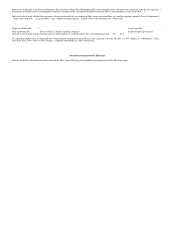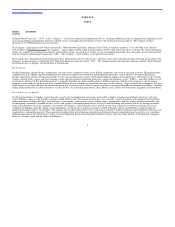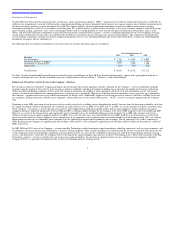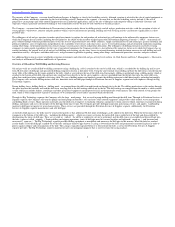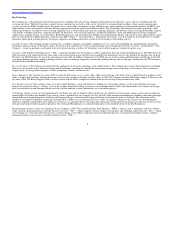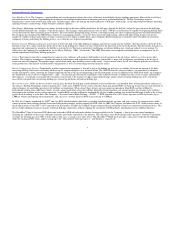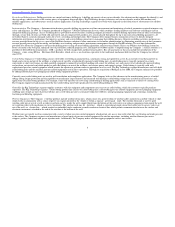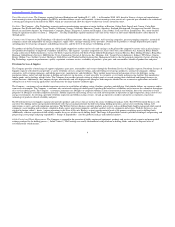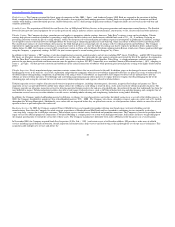National Oilwell Varco 2012 Annual Report Download - page 11
Download and view the complete annual report
Please find page 11 of the 2012 National Oilwell Varco annual report below. You can navigate through the pages in the report by either clicking on the pages listed below, or by using the keyword search tool below to find specific information within the annual report.
Index to Financial Statements
Fluids Services. The Company acquired the Spirit group of companies in May 2009 (Spirit) and Ambar in January 2010. Both are engaged in the provision of drilling
fluids, completion fluids and other related services. This division is also engaged in barite mining operations. Drilling fluids are designed and used to maintain well bore
stability while drilling, control downhole pressure, drill bit lubrication, and as a drill cuttings displacement medium. Completion fluids are used to clean the well bore and
stimulate production.
Portable Power. The acquisition of Welch Sales and Service, Inc. in 2008 placed Wellsite Services in the power generation and temperature control business. The Portable
Power division provides rental equipment for use in the upstream oil and gas industry, refinery and petrochemical, construction, events, disaster relief and other industries.
Tubular Coating. The Company develops, manufactures and applies its proprietary tubular coatings, known as Tube-Kote® coatings, to new and used tubulars. Tubular
coatings help prevent corrosion of tubulars by providing a tough plastic shield to isolate steel from corrosive oilfield fluids such as CO 2 , H 2 S and brine. Delaying or
preventing corrosion extends the life of existing tubulars, reduces the frequency of well remediation and reduces expensive interruptions in production. In addition, coatings
are designed to increase the fluid flow rate through tubulars by decreasing or eliminating paraffin and scale build-up, which can reduce or block oil flow in producing wells.
The smooth inner surfaces of coated tubulars often increase the fluid through-put on certain high-rate oil and gas wells by reducing friction and turbulence. The Companys
reputation for supplying quality internal coatings is an important factor in its business, since the failure of coatings can lead to expensive production delays and premature
tubular failure. In 2005, the Company created a 60%-owned joint venture in China with the Huabei Petroleum Administration Bureau, which coats Chinese produced drill pipe
using the Companys proprietary coatings. In 2007, the joint venture opened a second coating plant in Jiangyin City, China.
In addition to the Companys TK® coatings, it also has complementary corrosion control products and services including TK® Liners, TuboWrap, and KC-IPC Connections.
TK Liners are fiberglass-reinforced tubes which are inserted into steel line pipe. This safeguards the pipe against corrosion and extends the life of the pipeline. In conjunction
with the Thru-Kote® connection system customers can weld a sleeve for a continuous fiberglass lined pipeline. Tubo-Wrap is a high performance external coating that
protects the pipe during installation and from corrosion once the pipeline is in place. KC-IPC Connections use a modified American Petroleum Institute (API) coupling to
create a gas-tight seal that prevents corrosion and turbulence in the critical connections of tubulars while protecting the internal plastic coating at the highly loaded contact
points.
Tubular Inspection. Newly manufactured pipe sometimes contains serious defects that are not detected at the mill. In addition, pipe can be damaged in transit and during
handling prior to use at the well site. As a result, exploration and production companies often have new tubulars inspected before they are placed in service to reduce the risk
of tubular failures during drilling, completion, or production of oil and gas wells. Used tubulars are inspected by the Company to detect service-induced flaws after the
tubulars are removed from operation. Used drill pipe and used tubing inspection programs allow operators to replace defective lengths, thereby prolonging the life of the
remaining pipe and saving the customer the cost of unnecessary tubular replacements and expenses related to tubular failures.
Tubular inspection services employ all major non-destructive inspection techniques, including electromagnetic, ultrasonic, magnetic flux leakage and gamma ray. These
inspection services are provided both by mobile units which work at the wellhead as used tubing is removed from a well, and at fixed site tubular inspection locations. The
Company provides an ultrasonic inspection service for detecting potential fatigue cracks in the end area of used drill pipe, the portion of the pipe that traditionally has been the
most difficult to inspect. Tubular inspection facilities also offer a wide range of related services, such as API thread inspection, ring and plug gauging, and a complete line of
reclamation services necessary to return tubulars to useful service, including tubular cleaning and straightening, hydrostatic testing and re-threading.
In addition, the Company applies hardbanding material to drill pipe, to enhance its wear characteristics and reduce downhole casing wear as a result of the drilling process. In
2002, the Company introduced its proprietary line of hardbanding material, TCS 8000. The Company also cleans, straightens, inspects and coats sucker rods at 11 facilities
throughout the Western Hemisphere. Additionally, new sucker rods are inspected before they are placed into service, to avoid premature failure, which can cause the oil well
operator to have to pull and replace the sucker rod.
Machining Services. In 2005, the Company acquired Turner Oilfield Services and expanded our product offering into thread repair, tool joint rebuilding and sub
manufacturing. Since then the Company has made strategic acquisitions of Hendershot and Mid-South and has expanded its machining services internally to develop a
one-stop-shop concept for its drill pipe customers. Thread repair services include rotary shouldered and premium connections. The Company is licensed to perform thread
repair services for API and proprietary connections. Tool joint rebuilding is a unique process to restore worn drill pipe tool joints, drill collars and heavy weight drill pipe to
the original specifications to extend the service life of those assets. The Company manufactures downhole tools and is API licensed for this process in several locations.
In November 2009, the Company acquired South Seas Inspection (S) Pte. Ltd., (SSI) and certain assets of its Brazilian affiliate. SSI provides a wide array of oilfield
services including rig and derrick construction, derrick inspection and maintenance, drops surveys and load testing at the rig through the use of rope access technicians. This
acquisition adds multiple new services and allows the
10


